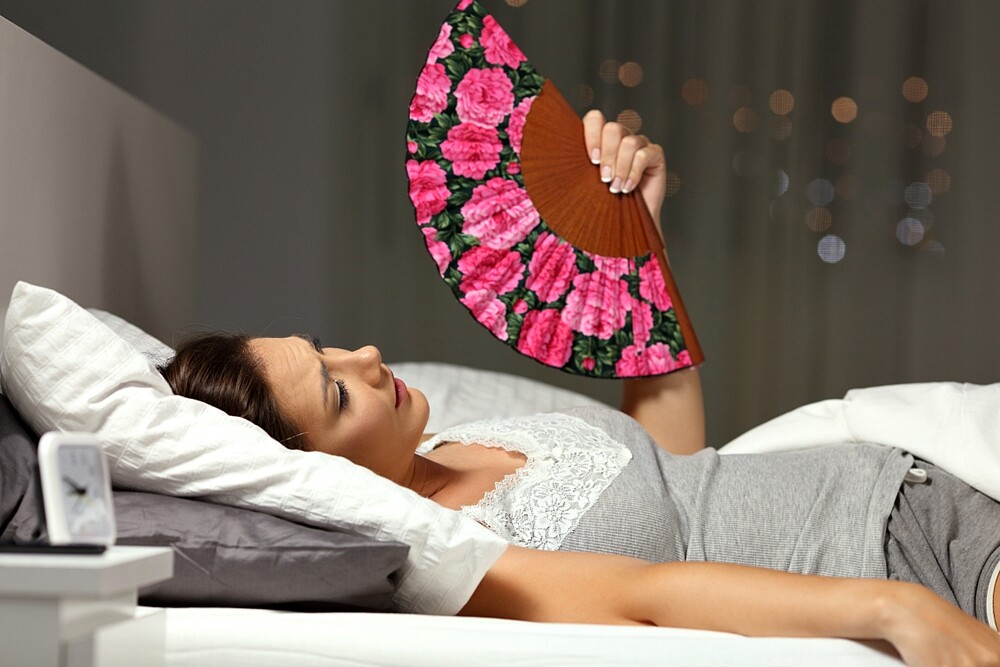Night sweat has harmless reasons in many cases, but it can also be caused by serious diseases. We explain possible triggers and what helps.
What is night sweats?
As the name suggests, night sweat stands for increased night sweating. There can be many different causes for this – most of them are rather harmless and obvious. For example, it is simply too warm under the duvet or the bedroom is overheated due to the heating setting. If there are no other symptoms apart from the sweating itself, the likelihood that an illness is responsible for it is rather low.
In the medical sense, night sweat (nocturnal hyperhidrosis) rather stands for regular heavy sweating during the night over a longer period of time. Here the cause is not directly obvious, various diseases can be responsible. Patients often wake up at night, their clothes and bed sheets are so sweaty that they have to get up and change them. In severe cases, patients even have to take a shower to rid their body of sweat. During the day, however, they suffer little or no sweating.
Night sweats and sleep disorders
As those affected are often torn from their sleep by night sweats, they tend to suffer from tiredness during the day and feel exhausted and stressed. And poor sleep, in turn, can weaken the immune system in the long run, making us more susceptible to infectious diseases.
Causes for night sweats
Among the causes of night sweats are:
- Poor sleeping conditions, e.g. heat in the room, blankets too thick
- Infectious diseases, e.g. influenza
- Medication, e.g. antidepressants
- Consumption of alcohol, spicy food or nicotine
- Metabolic diseases, e.g. hyperthyroidism or diabetes
- Menopause
- Overweight
- Pregnancy
- Cancer, e.g. lymph gland cancer or leukaemia
- Pneumonia
- Autoimmune diseases, e.g. rheumatoid arthritis
- Psychological complaints, e.g. stress, anxiety, mental strain or sleep disorders
- Neurological diseases, e.g. Parkinson’s
However, it is not always possible to find a clear cause for sweating. This is called idiopathic night sweat, in which the sweat production is overactive. Often affected patients also suffer from sweating during the day.
When should I see a doctor for heavy sweating?
If night sweats, for which there is no obvious reason, occur more frequently, the doctor should be consulted. The same applies if one or more of the following symptoms also occur:
- Fever
- Sudden weight loss
- Diffuse pain
- Digestive disorders
- Breathing difficulties
Therapy: What helps against heavy sweating at night?
In general, it is primarily the underlying disease that causes nocturnal hyperhidrosis that is treated. However, there are also some measures that the patient himself can take to prevent night sweating. These include:
- Restrict or completely omit stimulants such as alcohol and cigarettes
- Drink two to three litres of water daily
- Drink a maximum of two cups of coffee a day – the last one in the afternoon
- Avoid fatty and heavily spiced food in the evening
- Pay attention to the optimal sleeping temperature: For most people it is between 16 and 19 degrees
- Introduce relaxation rituals – for example by learning breathing techniques
- Take a lukewarm shower (not cold, this only stimulates the blood circulation)
- Pay attention to breathable and light clothing
And if the sweating stops?
If these tips do not help, various diseases could be behind the sweating. Then it’s time to see a doctor. If you suffer from mental problems in particular, you should seek help from a psychotherapist.

